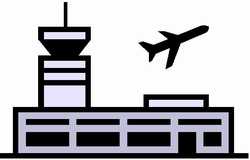Thu, Jun 17, 2010
New Phraseology Goes Into Effect June 30th
 Beginning at the end of this month,
Air Traffic Controllers will no longer be using the phase "Taxi To"
when clearing aircraft to an assigned takeoff runway.
Beginning at the end of this month,
Air Traffic Controllers will no longer be using the phase "Taxi To"
when clearing aircraft to an assigned takeoff runway.
The change establishes the requirement that an explicit runway
crossing clearance be issued for each runway (active, inactive, or
closed) crossing and requires an aircraft or vehicle to have
crossed the previous runway before another runway crossing
clearance may be issued. At airports where the taxi route between
runway centerlines is less than 1,000 feet apart, multiple runway
crossings may be issued after receiving approval by the Terminal
Services Director of Operations. Aircraft will no longer
automatically be authorized to cross all runways and taxiways which
the taxi route intersects except the assigned runway.
In the amended taxi and ground order procedures, controllers are
instructed to issue the route for the aircraft or other vehicle to
follow on the movement area in concise and easy to understand
terms. The taxi clearance must include the specific route to
follow. When a taxi clearance to a runway is
issued to an aircraft, controllers should confirm the aircraft has
the correct runway assignment. A pilot's read back of taxi
instructions with the runway assignment can be considered
confirmation of runway assignment.
 Movement of aircraft or vehicles on
nonmovement areas is the responsibility of the pilot, the aircraft
operator, or the airport management. Controllers are told that when
authorizing either to proceed on the movement area, or to any point
other than assigned takeoff runway, specify the taxi instructions.
If it is the intent to hold the aircraft or vehicle short of any
given point along the taxi route, routes should
be issued followed by holding instructions. The
absence of holding instructions authorizes an aircraft/vehicle to
cross all taxiways that intersect the taxi route.
Movement of aircraft or vehicles on
nonmovement areas is the responsibility of the pilot, the aircraft
operator, or the airport management. Controllers are told that when
authorizing either to proceed on the movement area, or to any point
other than assigned takeoff runway, specify the taxi instructions.
If it is the intent to hold the aircraft or vehicle short of any
given point along the taxi route, routes should
be issued followed by holding instructions. The
absence of holding instructions authorizes an aircraft/vehicle to
cross all taxiways that intersect the taxi route.
Under the new procedure, an authorization for an aircraft to
taxi to an assigned takeoff runway should include the departure
runway followed by the specific taxi route. Controllers are
instructed to issue hold short restrictions when an aircraft will
be required to hold short of a runway or other points along the
taxi route.
Finally, the new procedures say that aircraft or vehicles must
receive a runway crossing clearance for each runway that their taxi
route crosses. An aircraft or vehicle must have crossed a previous
runway before another runway crossing clearance may be issued.
The FAA Runway Safety Call to Action Committee issued several
recommendations to address improving runway safety across the NAS.
In response to the Committee's recommendations, the ATO convened a
Safety Risk Management Panel to evaluate the safety of the
Committee recommendations. These are two of the recommended changes
from the Call to Action Committee.
More News
Aero Linx: International Federation of Airworthiness (IFA) We aim to be the most internationally respected independent authority on the subject of Airworthiness. IFA uniquely combi>[...]
Ultrahigh Frequency (UHF) The frequency band between 300 and 3,000 MHz. The bank of radio frequencies used for military air/ground voice communications. In some instances this may >[...]
A Few Questions AND Answers To Help You Get MORE Out of ANN! 1) I forgot my password. How do I find it? 1) Easy... click here and give us your e-mail address--we'll send it to you >[...]
From 2019 (YouTube Edition): Learning To Paint Without Getting Any On Your Hands PPG's Aerospace Coatings Academy is a tool designed to teach everything one needs to know about all>[...]
Also: Sustainable Aircraft Test Put Aside, More Falcon 9 Ops, Wyoming ANG Rescue, Oreo Cookie Into Orbit Joby Aviation has reason to celebrate, recently completing its first full t>[...]
 ANN's Daily Aero-Linx (05.06.25)
ANN's Daily Aero-Linx (05.06.25) ANN's Daily Aero-Term (05.06.25): Ultrahigh Frequency (UHF)
ANN's Daily Aero-Term (05.06.25): Ultrahigh Frequency (UHF) ANN FAQ: Q&A 101
ANN FAQ: Q&A 101 Classic Aero-TV: Virtual Reality Painting--PPG Leverages Technology for Training
Classic Aero-TV: Virtual Reality Painting--PPG Leverages Technology for Training Airborne 05.02.25: Joby Crewed Milestone, Diamond Club, Canadian Pilot Insurance
Airborne 05.02.25: Joby Crewed Milestone, Diamond Club, Canadian Pilot Insurance




